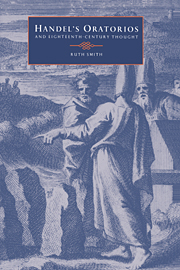Book contents
- Front Matter
- Contents
- Acknowledgements
- Abbreviations
- Introduction
- PART 1 ENGLISH ORIGINS OF ENGLISH ORATORIO
- PART II THE PATRIOT LIBRETTO FROM THE EXCISE BILL TO THE JEW BILL: ISRAELITE ORATORIOS AND ENGLISH POLITICS
- Chapter 8 Political events and political thought
- Chapter 9 Allegorical politics
- Chapter 10 Moral politics
- Chapter 11 ‘Esther’ to ‘Athalia’
- Chapter 12 In time of war
- Chapter 13 Images of government
- Chapter 14 The conflict of public and private interests
- Chapter 15 Coda: the end of Handel's Israelite oratorios
- Appendix I Libretto authors and sources
- Appendix 2 The oratorios and Methodism
- Notes
- Bibliography of sources cited
- Index
Chapter 8 - Political events and political thought
Published online by Cambridge University Press: 22 September 2009
- Front Matter
- Contents
- Acknowledgements
- Abbreviations
- Introduction
- PART 1 ENGLISH ORIGINS OF ENGLISH ORATORIO
- PART II THE PATRIOT LIBRETTO FROM THE EXCISE BILL TO THE JEW BILL: ISRAELITE ORATORIOS AND ENGLISH POLITICS
- Chapter 8 Political events and political thought
- Chapter 9 Allegorical politics
- Chapter 10 Moral politics
- Chapter 11 ‘Esther’ to ‘Athalia’
- Chapter 12 In time of war
- Chapter 13 Images of government
- Chapter 14 The conflict of public and private interests
- Chapter 15 Coda: the end of Handel's Israelite oratorios
- Appendix I Libretto authors and sources
- Appendix 2 The oratorios and Methodism
- Notes
- Bibliography of sources cited
- Index
Summary
While there is much in the oratorios that does not have to do with politics, there is much that does – more than has hitherto been recognised. Few musicians are conversant with the details of mid-eighteenth-century political ideas and events; most historians are unaware of the detail of the librettos. Hence political references in the oratorios have been neglected, though there have been several notable studies of political references in other literature of the 1730s and 1740s, including music theatre, and the accounts by John Loftis, Bertrand Goldgar and Christine Gerrard have provided stepping stones for the present study. Mid-eighteenth-century Britons were obsessively political in their outlook; our interpretations of one of the major artistic genres of the period should acknowledge this fact, and add Handel's oratorios to our evidence for it. The second part of this book suggests connections between the political concerns of the day and the Israelite librettos, those based on the Old Testament or Apocrypha, in which the Israelite nation is the society which the action concerns. Political themes, including some identified in these chapters, could be (and are beginning to be) elucidated in Handel's secular librettos, as in his operas; but the Israelite librettos take precedence among his works, and among all eighteenth-century English music theatre works, as a distinct group of compositions portraying the life of a nation.
What were the political events and thoughts of the oratorio years which the librettists could have absorbed into their texts?
- Type
- Chapter
- Information
- Handel's Oratorios and Eighteenth-Century Thought , pp. 173 - 201Publisher: Cambridge University PressPrint publication year: 1995



